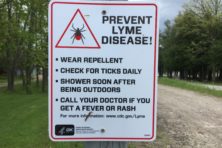Article posted Thursday, October 9, 2014 12:46pm
- Share
- Tweet
- Pin
- Share

In general, nicotine is considered a poison, but in certain hornworm larvae the poison is put to good use. Hornworms are caterpillar-like larvae with a spike-like appendage sticking up from their rear ends. Larvae of Manduca sexta, a small hornworm, feed on the tobacco plant Nicotiana attenuate, and they not only excrete nicotine but they also process it for defensive purposes. To repel predators such as wolf spiders, larvae blow vaporized nicotine out the breathing openings along the sides of their bodies. This defensive strategy was discovered when scientists raised larvae on tobacco plants missing the nicotine gene. These nicotine-free larvae were gobbled up by wolf spiders. Another experiment involved introducing starving wolf spiders to larvae that fed on plants without the nicotine gene mixed with larvae that fed on regular tobacco plants. The spiders avoided larvae with nicotine halitosis and devoured those that fed on nicotine-free plants. (Kumar et al, 2014, Proc. of the National Academy of Sciences, Jan. 28; The Week, Jan. 17, 2014)


